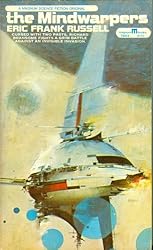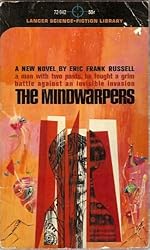
![]() The Mindwarpers by Eric Frank Russell
The Mindwarpers by Eric Frank Russell
For his ninth novel out of what would ultimately run to 10, English sci-fi author Eric Frank Russell pulled a bit of a switcheroo on his readers. The book in question was initially released in the U.K. in 1964 in a hardcover edition by British publishing house Dennis Dobson, sporting the title With a Strange Device. A year later, it was released here in the U.S. as a 50-cent Lancer paperback (the edition that I was fortunate enough to acquire at Brooklyn bookstore extraordinaire Singularity), as its author was turning 60, but with a new and perhaps catchier title: The Mindwarpers. Written at the height of Cold War tensions, and at the peak of the world’s fascination with espionage, spies and suchlike — not to mention a scant two years after the highly praised release of the cinematic stunner The Manchurian Candidate — the book, to the surprise of Russell’s longtime fans, contained very little in the way of actual science fiction material per se. Rather, it is a rather noirish affair dealing with murder, pursuit and a goodly dose of paranoia. What sci-fi trappings there are only crop up in the book’s final chapter, and might not even be so far-fetched as they appear at first blush. Still, as was typical for Russell, the book remains compulsively readable, and the author’s tough-guy prose strikes the reader as being a bit more polished than usual, coming as it does relatively late in this author’s career. Personally, I found the entire affair most enjoyable, indeed.
In the book, the reader encounters a top-level metallurgist named Richard Bransome; the husband of a pretty wife and father of two young kids. Bransome works in a highly classified government research center where, unfortunately, some strange things have been transpiring lately. Scientists of all grades and fields have been resigning, disappearing, or going on extended leaves; many more than could be attributable to deaths, sicknesses or retirements. Not that this does much to disturb Bransome’s easygoing suburban lifestyle. But one day, while sitting in a railway coffee shop, he overhears two truckers discussing human bones that had recently been discovered, buried under a tree in a small town called Burleston, and this immediately awakens a dormant memory in his mind. He flashes back and recalls that some 20 years earlier, he had murdered a woman named Arline Lafarge in that very town, and had buried her body beneath a tree! Thus begins a veritable nightmare for Bransome. He soon notices a rather large man tailing him home every night, while imagining that the cops even now must be closing in on him. He can see nothing for it but to lie to his wife and travel to Burleston himself, to see just how close the law really is on his trail. And after quite the hellacious odyssey, during which Bransome plays cat and mouse with the law and a cagey agent from Military Intelligence, the truth is finally revealed…
 I must say, for a goodly portion of Russell’s book, the reader wonders about our purported hero. Bransome seems to be such a decent sort when we first meet him; can he then really have committed such a heinous crime two decades back? Or is his brain simply playing tricks on him, and is he — as he mentions somewhere — merely “a boat floating on a sea of illusion?” Russell, to his great credit, keeps us guessing for a while while ratcheting up the tension. And indeed, it strikes this reader that The Mindwarpers (more of a spoilerish title, to be sure, although more generally descriptive, than With a Strange Device) might have worked well as a latter-day Hitchcock outing, what with its lone man on the run, on a cross-country chase, pursuing he knows not what, while at the same time being trailed by the authorities.
I must say, for a goodly portion of Russell’s book, the reader wonders about our purported hero. Bransome seems to be such a decent sort when we first meet him; can he then really have committed such a heinous crime two decades back? Or is his brain simply playing tricks on him, and is he — as he mentions somewhere — merely “a boat floating on a sea of illusion?” Russell, to his great credit, keeps us guessing for a while while ratcheting up the tension. And indeed, it strikes this reader that The Mindwarpers (more of a spoilerish title, to be sure, although more generally descriptive, than With a Strange Device) might have worked well as a latter-day Hitchcock outing, what with its lone man on the run, on a cross-country chase, pursuing he knows not what, while at the same time being trailed by the authorities.
Russell’s ninth novel might also be the oddball in his canon due to its marked absence of humor, a factor almost as surprising as its dearth of sci-fi content. Russell was supposedly the favorite author of Astounding Science-Fiction editor John W. Campbell, and author Brian Aldiss has gone so far as to call him “Campbell’s licensed jester.” The other three novels that I’ve read of Russell’s — Men, Martians and Machines, Wasp, and The Great Explosion — have all been very amusing affairs, with any number of laugh-out-loud lines; indeed, The Great Explosion is one of the funniest sci-fi novels that I’ve ever read. How strange, then, to run across a Russell book with nary a single chuckle to be had. This is a rather grim, straight-faced novel, in which the author seems to be trying his hand at the gritty espionage thrillers so in vogue back when. Still, as I say, despite the lack of humor, of aliens, of rocket ships and blasters, his book works splendidly. It is a short, compact affair that propels the reader from one nail-biting set piece to the next; a genuine page-turner.
Thus, I am hard put to understand Scottish critic David Pringle’s assessment of the book. Writing in his Ultimate Guide to Science Fiction, Pringle tells us that the book is “very dated, rather dull.” I can sort of understand the first half of that statement — the book is a Cold War thriller, after all … although relations between the U.S. and some other countries that shall go unnamed do seem to be growing a tad chillier these days, don’t they? — but “dull”? I’m not exactly sure why Pringle levies that accusation. As I said, this reader found The Mindwarpers to be rather swift moving, exciting and suspenseful … in a word, Hitchcockian. Well, I suppose, Mr. Pringle, that this is the reason why there’s both vanilla and chocolate out there, right? (And let’s not forget that Damien Broderick’s The Dreaming Dragons, which Mr. Pringle chose for inclusion in his Science Fiction: The 100 Best Novels, was a book that I had to force myself to finish.) I don’t know; perhaps I’m just more easily entertained by an interesting tale, well told, than others. I certainly do not regret having had my mind warped by this one, that’s for sure…



I find if I take every Trek reference out of them (the title, the character names, the ship names, etc.),…
I loved this deep dive into Edwige Fenech's Giallo films! Her performances add such a unique flavor to the genre.…
It would give me very great pleasure to personally destroy every single copy of those first two J. J. Abrams…
Agree! And a perfect ending, too.
I may be embarrassing myself by repeating something I already posted here, but Thomas Pynchon has a new novel scheduled…